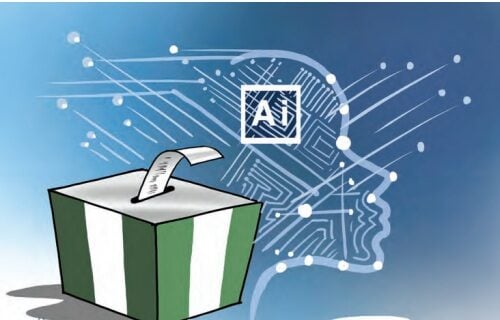As Nigeria prepares for the 2027 general election, it stands at a critical juncture. The nation’s electoral journey has consistently been marred by logistical challenges allegations of fraud, and a consequent decline in public trust. The 2023 presidential election saw a historic low voter turnout of 26.72%, which is a clear sign of public disinterest and disenchantment with the political system. It is against this turbulent backdrop that a new, powerful variable has been introduced, Artificial Intelligence (AI). The Independent National Electoral Commission (INEC) made history in May 2025 when it announced the creation of a specialized AI unit within its ICT Department. This move signals an ambitious technological shift, a clear intention to harness the power of AI to modernize elections and, in their words, make them “more credible, transparent, and efficient”.
The question is, is the integration of AI a masterstroke that could finally deliver transparent and trusted elections citizens have long demanded, or does it open a Pandora’s box of new, more sophisticated threats capable of undermining the very foundations of our electoral process?
The optimistic vision for AI in Nigeria’s elections is compelling. Proponents see it as a powerful tool to address the systemic weaknesses that have plagued past polls. INEC’s stated goals for its new AI division focus on moving from reactive problem-solving to proactive, data-driven management of the entire electoral cycle. At the heart of electoral credibility is the assurance that each vote is cast by a legitimate voter and counted accurately. AI offers several avenues to strengthen this core function as follows.
Voter List Management – an accurate voter register is the bedrock of a fair election. International best practices suggest AI is particularly well-suited for this task. As outlined in a report by International IDEA, AI algorithms can meticulously audit and “clean” voter rolls by detecting duplicate registrations, flagging incomplete data, and identifying statistically improbable entries for human review. This automates a historically cumbersome and error-prone process.
Voter Accreditation – building on the foundation of the Bimodal Voter Accreditation System (BVAS) AI-powered biometrics could offer faster and more accurate facial and fingerprint recognition. This would significantly reduce the possibility of voter impersonation and speed up the accreditation process on election day, a key bottleneck in previous elections.
Results Management – AI systems could be designed to monitor incoming results from thousands of polling units in real-time. By analyzing data streams, these systems can flag statistical anomalies such as unusually high turnout in one area or results that deviate significantly from historical patterns that might indicate tampering or error, allowing for immediate investigation.
Conducting national elections in Nigeria is a monumental logistical undertaking. INEC’s own statements reveal a focus on using AI to optimize these complex operations. AI can analyze geographic data, and security reports to plan the most efficient and secure routes for distributing sensitive materials like ballot papers and BVAS machines. It can also help predict potential bottlenecks and guide the optimal allocation of staff and resources to polling units based on voter density and historical challenges. The shift towards AI represents a move towards an evidence-based approach to election management. Instead of relying solely on past experience, INEC can use predictive analytics to forecast costs identify high-risk areas for electoral violence or malpractice and manage resources more effectively.
Beyond the mechanics of voting, AI can also play a role in creating a more informed and engaged electorate through AI-Powered voter education initiatives. Following examples from other African nations, such as Kenya, which has developed WhatsApp-based chatbots, INEC could deploy multilingual AI assistants for large scale voter education. These tools could operate 24/7, answering voter questions providing personalized information on polling unit locations, and demystifying the voting process thereby making electoral information more accessible to all.
Furthermore, a key mandate for INEC’s AI division is to counter disinformation and misinformation during elections. AI tools can continuously monitor social media and news sites to detect emerging disinformation campaigns. This allows the commission to issue rapid, targeted clarifications and warnings helping to inoculate the public against fake news. Civil society is already exploring this space, with technological innovations like the NaijaElections Generative AI Tool demonstrating the potential.
While the potential gains are significant, the path to an AI-driven election is fraught with peril. The risks are not merely theoretical, they are grounded in Nigeria’s specific socio-technical realities and could exacerbate existing vulnerabilities potentially leading to a crisis of legitimacy far greater than any seen before.
The most immediate and alarming threat is the weaponization of generative AI to manipulate public opinion. This goes far beyond simple “fake news.” Nigerian media has already flagged deepfakes as a” looming crisis” for the 2027 general election. Malicious actors can now easily create hyper-realistic but entirely fabricated videos or audio clips. Imagine a deepfake video of a leading presidential candidate appearing to announce their withdrawal from the race on the eve of the election or a fabricated audio recording of an INEC official admitting to a conspiracy or a fabricated video of the INEC Chairman announcing a second runner-up in the election as the winner. The potential to sow chaos, incite violence, and irrevocably damage reputations with the use of deepfake is immense. Generative AI enables the mass production of targeted, context-aware misinformation at a scale and speed that human fact-checkers cannot possibly match.
Deploying sophisticated technology in a vacuum is a recipe for disaster. Nigeria’s foundational infrastructure and human capital present formidable obstacles to the successful and equitable leverage of AI in elections. Infrastructural deficits such as epileptic power supply poses serious challenges to leveraging AI in our elections. A 2025 study highlighted that many Nigerians experience the equivalent of”160 days in the dark” per year. How can AI-dependent systems, from accreditation devices to data centers function effectively in an environment of frequent power outages, especially in rural areas?
Moreso, a high-tech election risks disenfranchising millions. According to Data Reportal (2025), Nigeria’s internet penetration rate stands at just 45.4%. Furthermore, UNICEF notes that a staggering 78% of Nigerian youth lack essential digital literacy skills. An over-reliance on digital platforms for voter education or registration could exclude the poor, the elderly, and rural populations, creating a two-tier electoral system.
Beyond infrastructure, the very nature of some AI systems poses a fundamental challenge to transparency and fairness. Unlike traditional ballot box stuffing, which can be physically observed, manipulating an AI algorithm is invisible to the naked eye. A compromised codebase or biased training data could systematically disenfranchise voters or alter results in ways that are almost impossible for non-experts to detect or prove, leading to concerns that the election could be “rigged by code, not criminals.” While AI can enhance security, it also provides adversaries with powerful new tools. AI can be used to craft highly convincing phishing emails to steal credentials from INEC officials or to launch sophisticated denial-of-service attacks to cripple electoral infrastructure on election day.
INEC cannot and should not do this alone. Building trust requires a broad coalition. This involves continuous engagement with civil society organizations, academic institutions with technical expertise, ethical technology companies, and international partners.
In conclusion, the introduction of artificial intelligence into Nigeria’s electoral framework presents a stark choice for the 2027 general elections.
–Lepgak is a Program Officer at Yiaga Africa.
Conversation with Azu returns on Friday , August 15











